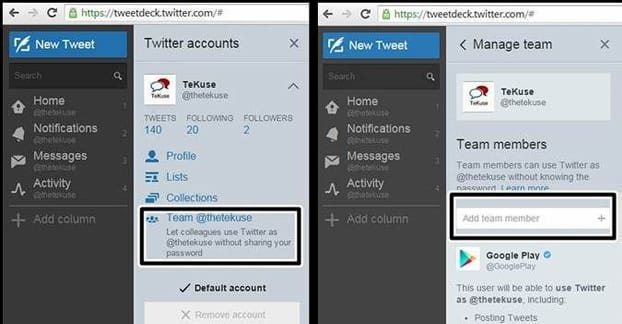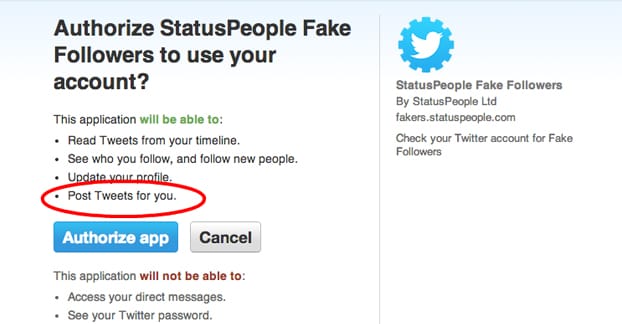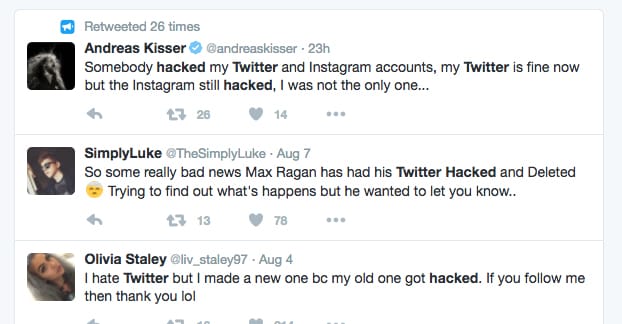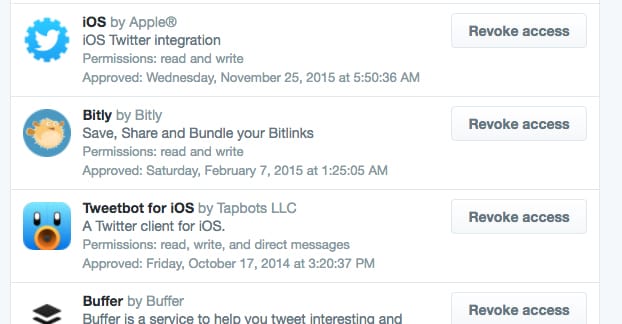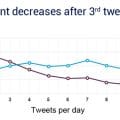Has your Twitter profile been idle for a while? Has it been active, but people are pointing out strange content? Did you browse your feed and see something you don’t remember posting? There are all sorts of possible causes, so let’s do some troubleshooting.
Cause 1: Bad Memory
I’m going to be honest here, there’s a low chance this is actually going to be the answer to your problem. However, I know that some people use Twitter when they’re under the influence of drugs or alcohol, and as a consequence they’ll post content that they have no recollection of posting. Now, nine times out of ten if you’re seeing a post you don’t remember making, you’ll at least be able to identify whether or not it’s the kind of content you would post even while inebriated.
I include this option because it gives me a place to start talking about identifying the sort of content being posted. There are generally two types of tweets that might be made on your account without your knowledge. One is the human post, and one is the advertising post.
The human post is likely to be content you recognize as coming from a human, even though it’s not you posting it. Advertising content has the hallmarks of a tweet made to advertise a product. Often, you will find these posts made when you enter a contest or claim an offer. Many companies will offer a coupon code in exchange for a tweet, because to them it’s valuable free advertising.
This will help you determine which one of the remaining causes is the real root behind your mysterious posts.
Cause 2: Team Members
This is probably the most benign of the options. Sometimes, when you use a third party tool to manage your social media presence, you end up with more than one associated login capable of posting on your account. This is perfectly normal. The idea is that some companies want to accumulate all of their social media presence into one location, but want it accessible to several team members, so that the team can handle all of the engagement and customer service necessary to keep their presence alive.
Now, sometimes, you might have a team you haven’t utilized. Or, you may have a team member assigned to certain duties, and they decided to try to “help out” by taking some of the weight off your shoulders.
If the mysterious tweets you see are still advertising your brand or posting from your perspective, it’s possible you have a team member you forgot about or who is going outside of their standard duties in an attempt to lighten the load. I recommend investigating your company to see who might be responsible for the posts. Some people don’t understand the need for a consistent voice or for the timing of social posts, and think they’re helping when they’re not.
Again, this is a relatively unlikely scenario. Typically, you have to directly approve a team member, so it’s unlikely that you would forget they exist. If you approved one so long ago that you did forget, and they still have access to the account, that’s a question for HR or for business policies.
Cause 3: Public Logins
This is another minor cause, so I’m not going to linger long on it. Some people, even in the upper tiers of business, have surprisingly poor computational security in mind. They leave their computers open and logged in, they log in to phones and hand them off to friends, and what have you. It’s completely unsurprising to me that people will even log in to demo units in stores like Best Buy or Office Max and fail to log out. Then anyone can use their account if they notice, at least until the devices are reset.
It’s possible you or someone who has control over your Twitter account left themselves logged in. This situation deserves a reprimand and a refresher on computer security, but it’s unlikely to be a truly dangerous or recurring problem so long as the person responsible has their head put on straight.
Cause 4: Authenticated Apps
This cause accounts for probably 90% of the mysterious tweets made on accounts that look like robotic advertising. Generally, if an app is going to post on your behalf, you have to authorize it to do so. There is a process for this in the Twitter API, so it’s not a hack and it’s not undesired behavior.
The trick is that sometimes people don’t read the fine print and realize that the app isn’t just allowed to make posts for you, but is definitely going to make posts for you. They authorize the app and then when it starts posting, they get concerned about hacking. The reality is that they gave the app permission and simply didn’t know what they were doing.
Hacking can also be an indirect cause of this, particularly if you haven’t authorized any apps recently. Apps stay authorized once you have given them permission to hook into your account. It’s possible that a dormant app was compromised or sold and is being used for spammy ends. It’s also possible that a dormant app was revived by the actual owners and put to use.
In either case, this is an easy problem to solve.
- From Twitter, click the profile picture up in the corner.
- In the menu that drops down, click the settings entry.
- On the left side of the page, look for “apps” and click it.
- Look for any app that is authorized and unwanted, and revoke access.
- Alternatively, click this link to be brought to the menu directly.
In the apps section, you will see a list of apps that you have authorized. Along with the name and author of the app, you will see the permissions – generally read and write, but direct message and other permissions can be included – and the date you approved it to work with your account.
If you’re not sure which app the tweets came from, you simply have to disable them one at a time and see if the problem goes away. If there’s no app that would have posted or that you don’t trust, you may have a different problem on your hands.
Again, this is generally the root cause of almost every unwanted post on Twitter. Be careful with what apps you authorize and, if you haven’t used them in a while or don’t plan to use them again, remove their authorization.
Cause 5: Account Hacked
I saved this cause for last, simply because too many people shout about being hacked whenever anything goes wrong, despite not knowing what a hacking actually entails or what a hacker can do. I’ve seen people think their favorite site was hacked when their internet is down. I’ve seen people claim they were hacked when they left themselves logged in in public.
A real hacking generally means you have lost access to your account. A more minor hacking might mean someone has accessed your password and can use your account, but hasn’t tried to lock you out. They may have even added an email to your password recovery process so that if you change your password, they get the new one as well.
There are many signs that your account could be hacked. For example, in addition to unwanted tweets, you might notice unwanted direct messages sent from your account. Following, unfollowing, and blocking can all be done by a hacker as well. Additionally, Twitter will send you a notification if they think your account has been hacked, by detecting unusual activity or logons from unusual locations. They may also lock your account and prompt you to change your password if they suspect you have been hacked.
The first thing you want to do is log into Twitter and check your settings. Make sure that the email you have set under account settings is your valid email address. You will need this for future steps.
The second thing you want to do is change your password. If you’re logged in, you can do this from the account settings password reset field. You will need your current password and you will need to put in a new password. If you have been logged out, there is a password reset request page that will allow you to reset your password via email, phone, or associated information on your account.
One thing to note is that changing your password will not log out devices that have been authenticated, such as an Android or iOS device. You will need to go into your apps section as indicated in cause 4 and revoke access to those devices.
Next, you will need to make sure that your email address is secure. It’s always possible that being hacked on Twitter was just a tertiary sign of a deeper compromise. If your email account has been compromised, you will need to work with whatever company runs it to make sure it’s re-secured and safe to use. Depending on the company, this can be pretty tricky, particularly if it’s a private email server run by your own company.
If you suspect that your email account is not secure, you should change your Twitter’s associated email to something else, even if that something else is temporary. Register a Gmail account or something if you have to.
Next, visit the apps section and see if any new, suspicious apps have been authorized. While you’re here, revoke access to any and all mobile devices or accounts that may have themselves been hacked. Even if you use something as secure as TweetDeck or HootSuite, you should revoke their access. You can always re-authorize it once you’re sure your account is secure.
If you use a third party app like TweetDeck and have multiple team members, log in and scan over the list of team members and revoke access to those who you do not believe should be authorized. It’s always possible someone added themselves to your team management and would otherwise be difficult to catch. It’s also possible that it’s just an ex-employee logging in and causing trouble.
Once you’re pretty sure that your information is secure, you should do cleanup.
First, run a virus scan on any computer you use to connect to the platform. Most viruses aren’t going to be interested in your Twitter account when they can bide their time and steal financial information instead, but it’s always possible that one of them is specialized to go after social media accounts.
Next, go through your Twitter account and delete the offending messages. You might also post a message about your account being compromised. If you do, make sure to note that no customer information was compromised, because otherwise people will worry. Be honest about the scope of the problem, though; if user information was compromised and you don’t say so or lie about it, you will be in violation of federal law.
Once everything is cleaned up, do the typical maintenance you’ve probably been putting off, because everyone does. Apply patches and set up two-factor login verification for accounts like Twitter.
Ideally, this will solve all of your problems. If it does not, you’ll need to look at other potential causes of strange posts on your feed. That said, it’s generally a good idea to do a security audit occasionally, just to make sure that everything is safe and secure. Change passwords to strong passwords, keep them separate from site to site, keep your software up to date, and keep a virus scanner on at all times.


